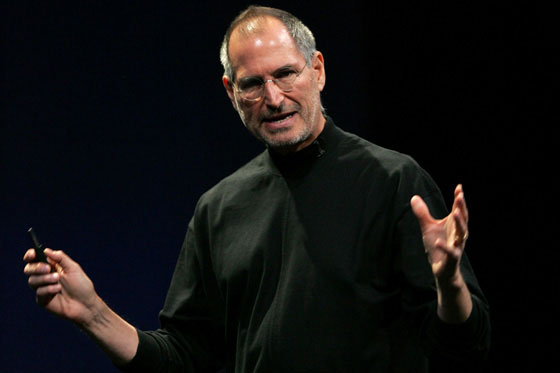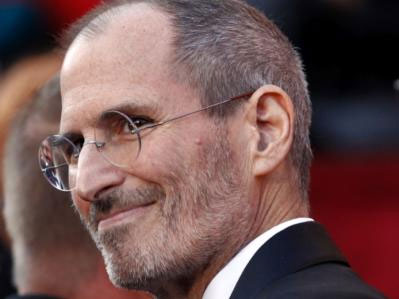Steve Jobs' philosophy of life
An abandoned child. A dropout. A director was fired. A failed entrepreneur. Steve Jobs has spent many years in the storm before staying on top of the world.
On his journey to change the world of computing and mobile, the co-founder of Apple (founded in 1976) has repeatedly failed, but for him, stumbling has been successful."I'm the only person I've ever known who lost a quarter of a billion dollars in a year. That's how I built my character," Jobs commented on himself and was quoted in the book Apple Confidential 2.0 (2004).

Steve Jobs is famous for his immortal words. Photo: Wired .
Like the other two geniuses of the world, Bill Gates and Mark Zuckerberg, Jobs dropped out of school. The 17-year-old boy then lacked orientation to life."I have no idea what I want to do in the future and I do not understand how the school will help me determine the way. There, I spend all the money my parents have spent my life. So I decided to take a break. studying with the belief that everything will be all right, " Jobs said in a speech at Stanford University in 2005.
The lesson here is not to encourage teenagers to stay away from school but to know what they want, what they are passionate about, and to pursue their passion. Although he decided to drop out, Jobs still signed up for a beautiful writing course, so he could connect those experiences to future products."A great part of Macintosh is that the people who made it were musicians, poets, artists, zoologists and historians, but now they are the world's top computer experts," Jobs. explanation of Mac's success. A Harvard University study (USA) also pointed out that creativity, newness is not naturally born, but requires the ability to mobilize, hook up invisibly many previous experiences.
If Bill Gates is a software business genius, Steve Jobs is an artist working at a computer. He has a hippy tendency to rebel, including running Apple, but is steadfast on the way to change the world. In 1983, he enticed John Sculley, then CEO of Pepsi, to join Apple in a famous question: "You want your whole life to sell that carbonated soft drink or have a chance to replace it." change the world? " . A year later, Sculley himself caused Jobs to be sacked by Apple for disagreement before the company invited him back in 1997.
See Apple's Different Different ads
Just a short time after coming back, the spirit and philosophy of this famous CEO was shown through Apple's Think Different classic ad. The clip mentions names like Albert Einstein, Bob Dylan, Martin Luther King, Thomas Edison, John Lennon, Pablo Picasso . with comments: "They are crazy. Rebellious. Making trouble. They are like They hate the principle and upset the status quo, you can disagree with them, honor or hate them, but you can't help but pay attention to them. they change and bring humanity forward, while they are considered mad people, we see geniuses, because people who are crazy enough to think can change the world are those who can do it. that".
That ad marked the return of Jobs and opened a new chapter full of glory for Apple. Jobs really knows how to change things. Apple does not create new markets, they "fix" them. iPods and iPhones appear when music players and phones are prevalent around the world. Bill Gates talked about tablets since 2001, and until 2010, Apple introduced the iPad. But they are still more successful than any consumer electronics company worldwide. So what is Jobs's secret? In an interview with BusinessWeek (May 1998), he shared: "One of my mantras is: Focus and Simplicity. Turn complex concepts into understandable things. Create something. that's much simpler than making it complicated. But when you do, you can move the tank filler. "
Steve Jobs not only has a vision of technology but also a vision in design. That 's encapsulated in his product building philosophy: "In many cases, users don't know what they want until you show them."
With passion and desire to change, money is not what he aims for. Jobs did not receive any bonuses, allowances or shares in 2010 except for a symbolic salary of $ 1. He holds 5.5 million shares of Apple, but has never sold them since returning to the company in 1997. "Becoming the richest person, but living in a cemetery doesn't mean anything to me. Every night before going to bed and finding that I had just done something great was really important, " the Wall Street Journal quoted his quote in May 1993. "If you can do something interesting, stand up and continue to do other wonderful things, instead of sitting smugly and gnawing on victory."

"If you've done something great, don't stop."
Unfortunately, genius is often destined. Steve Jobs died on October 5 after seven years of fighting pancreatic cancer, leaving many unfinished plans. He understood the harshness of the time so advised the students at Stanford University: "Your time is not much, do not waste by living someone else's life. Don't listen to dogma, because it is a failure. Don't let the noisy views overwhelm the voice inside you. Know what you want.Other things are secondary ".
But the most important lesson that Steve Jobs always reminded himself is: "Living the longing." (Stay Hungry, Stay Foolish) because of that, people can go to the end of passion, creativity and change.